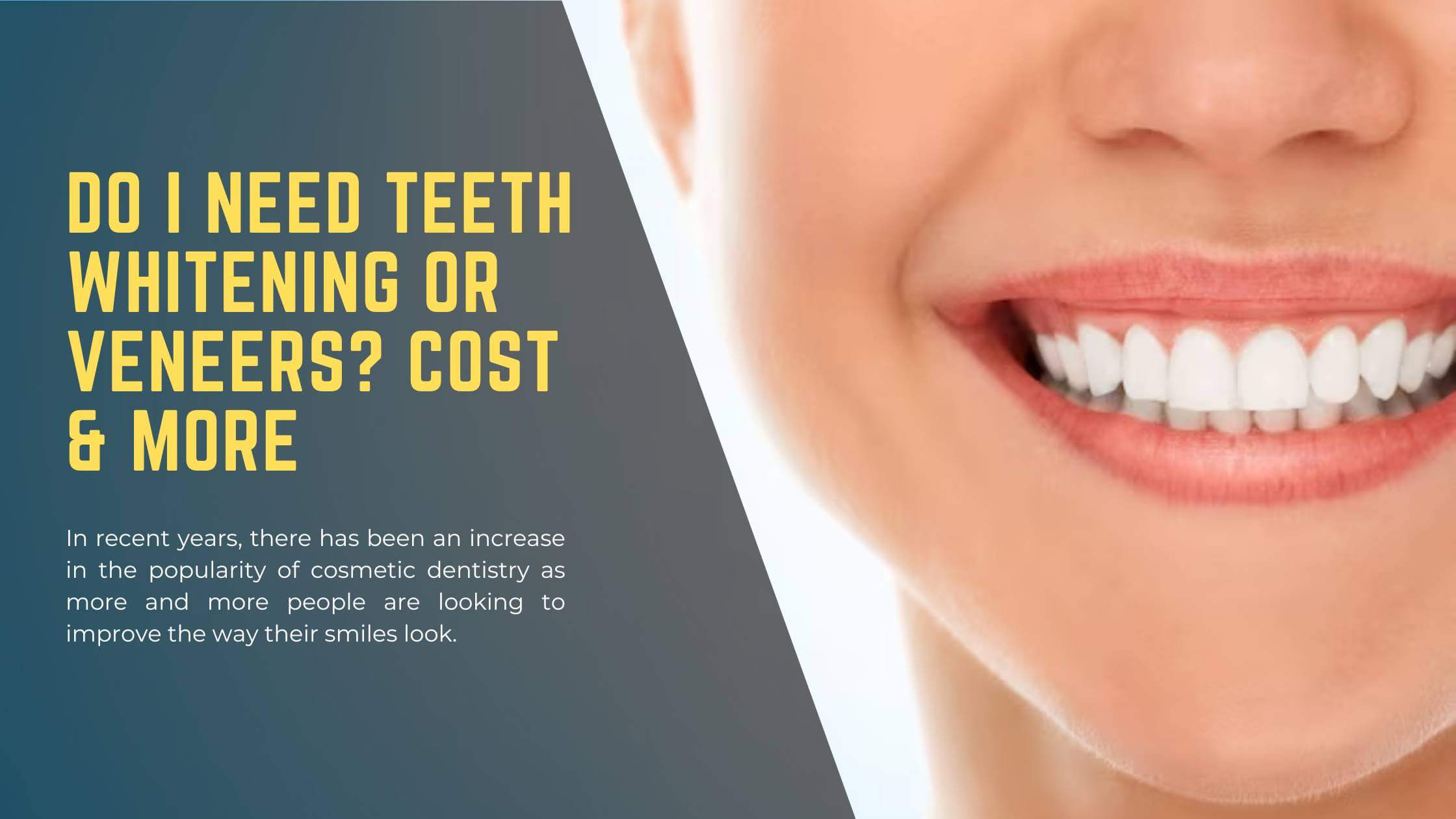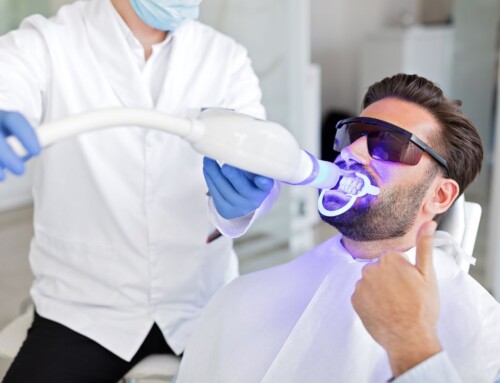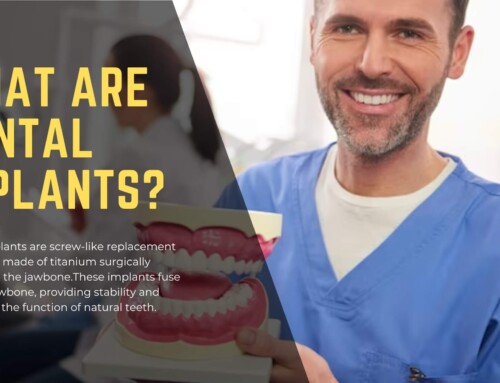
In recent years, there has been an increase in the popularity of cosmetic dentistry as more and more people are looking to improve the way their smiles look.
With a range of options, such as professional teeth whitening and veneers, individuals can now achieve the perfect white smile they’ve always wanted. In this District Dental blog, we will primarily focus on comparing and choosing between two popular cosmetic dentistry procedures: teeth whitening and veneers.
Understanding Teeth Whitening
Types of Teeth Whitening
Whitening Toothpastes
Some whitening toothpastes contain gentle polishing agents that remove surface stains. Over-the-counter (OTC) and professional whitening products contain hydrogen peroxide or carbamide peroxide to lighten the tooth’s color. Users can get their teeth 1-2 shades lighter, depending on the type of stains they have. Some whitening toothpaste contains baking soda or charcoal, which also have abrasive properties.
Whitening Strips and Gels
Whitening gels are peroxide-based gels applied to the surface of the teeth. The instructions and results vary depending on the strength of the peroxide. Whitening strips are thin, transparent strips coated with a peroxide-based formula. The strips work similarly to whitening gels. The strips are worn on teeth.
Initial results for both methods can be seen within a few days, and final results last about 4 months.
At-Home Whitening Kits
Customized trays containing a lower concentration of peroxide are provided for at-home use. The process takes longer, often a few weeks, with daily applications for a specified duration.
In-office Teeth Whitening
Professionals perform in-office teeth whitening using a higher concentration of active ingredients to achieve a visible result. In-office teeth whitening in Charlotte, NC, may require several sessions for patients to get the desired shade of white.
Power bleaching by a cosmetic dentist involves rinsing teeth with a potent hydrogen peroxide solution for 20 to 30 minutes. Laser therapy is sometimes used in these sessions; however, no solid research proves its whitening benefit.
Ideal Candidates for Teeth Whitening
Ideal candidates for teeth whitening typically have healthy teeth and gums. It is most effective for individuals with surface stains caused by factors like coffee, tea, tobacco, or aging. If you have sensitive teeth, it is recommended that you inform your dentist before starting a whitening procedure.
Benefits & Limitations For The Types
Whitening Toothpaste
Benefits:
- Can be incorporated into daily oral hygiene routines
- Available over-the-counter at most stores
- Can provide gradual improvement in tooth color over time
Limitations:
- Less effective than professional treatments
- Mainly removes surface stains
- Continued use may be required to maintain results
Whitening Strips and Gels
Benefits:
- Easy to use
- A prescription is not required
- Offers a gradual improvement in tooth color with regular use
Limitations:
- May lead to uneven whitening
- Users may experience tooth sensitivity during or after use
- May not provide as dramatic results
At-Home Whitening Kits
Benefits:
- Often includes custom trays for a more tailored fit
- Can be used at home without user’s inconvenience
- Affordable than in-office procedures
Limitations:
- Results can vary based on how consistently and accurately the kit is used
- Some users may experience tooth sensitivity
- Results may not match those of professional treatments
In-Office Teeth Whitening
Benefits:
- Administered by trained dental professionals
- Provides noticeable results in a single session
- Effective in whitening teeth compared to other options
Limitations:
- Expensive compared to at-home options
- A time-consuming procedure that requires visiting the dental office
- Patients may experience temporary tooth sensitivity
Exploring Dental Veneers
Dental veneers are thin, tooth-colored prosthetics attached to the front surface of teeth to improve the appearance. Veneers mainly tackle concerns like chipped, broken, and discolored teeth.
Veneers address various dental imperfections, while teeth whitening focuses specifically on brightening the natural color of teeth by removing surface stains. The choice between the two depends on the individual’s aesthetic goals and dental conditions.
Types of Veneers

Porcelain Veneers
Porcelain veneers are made from thin ceramic shells and molded to the shape of the tooth’s surface. Dentists remove some of the enamel from a patient’s teeth and custom-fit the veneers to them. The enamel removal keeps veneers in place on the surface of the teeth. Porcelain veneers resist stains better than composite veneers.
Composite Veneers
Composite veneers are made from composite resin (a mixture of plastic and ceramic). They can help fix issues like cracked teeth or small gaps in your teeth. The resin is applied directly to the teeth. In many cases, the entire treatment can be finished in one visit. The dentist will cure or harden the veneer with a special light.
Best Candidates For Veneers
Veneers are often used on people with:
- Discolored teeth
- Chipped or broken teeth
- Crooked and oddly shaped teeth
- Teeth that have gaps in between
Benefits & Potential Drawbacks
Benefits:
- They look natural
- Gums usually aren’t sensitive to porcelain
- Porcelain veneers are not easily stained
- They generally don’t require as much shaping as crowns do
Drawbacks:
- The process involves removing a thin layer of tooth enamel. This may make your tooth sensitive to hot and cold foods and drinks.
- Veneers usually cannot be repaired if they chip or crack.
- Veneers cost more than composite resin bonding.
- Veneers can come loose and fall off if you chew hard things or put too much pressure.
Cost Comparison
Cost of Teeth Whitening
Whitening toothpaste may cost $1 to $20, depending on the brand. Whitening strips and gels may cost around $10 to $55. Custom trays can range from $300 to $600, and in-office teeth whitening may cost about $800 to $1000.
Cost of Veneers
The veneers in Charlotte, NC cost, depends on the location, the types of veneers used, and your dentist’s expertise. According to an article published by Healthline, you can expect to pay between $925 and $2500 per tooth. Composite veneers cost around $400 to $2000 per tooth and can last up to 5-7 years.
Insurance doesn’t always include veneers because they are considered a cosmetic procedure.
Psychological and Physical Effects
Teeth whitening is a less invasive option compared to dental veneers. Whether in-office or at home, teeth whitening procedures are less invasive when compared to dental veneers. Teeth whitening may cause sensitivity issues after the treatment.
Altering the tooth’s structure for dental veneers may require patient commitment, which can induce anxiety. The enamel removal may cause temporary sensitivity for some, but it is often minimal and well-tolerated during recovery.
Key Takeaways and Consulting Experts
Choosing between whitening and veneers is a personal decision that should align with your needs and values. Therefore, it is imperative to weigh the factors and make an informed decision.
At DDS Charlotte, NC, we are committed to helping you achieve a beautiful, radiant smile reflecting your personality. For personalized guidance, please consult with the experts at South Charlotte Dentistry.





